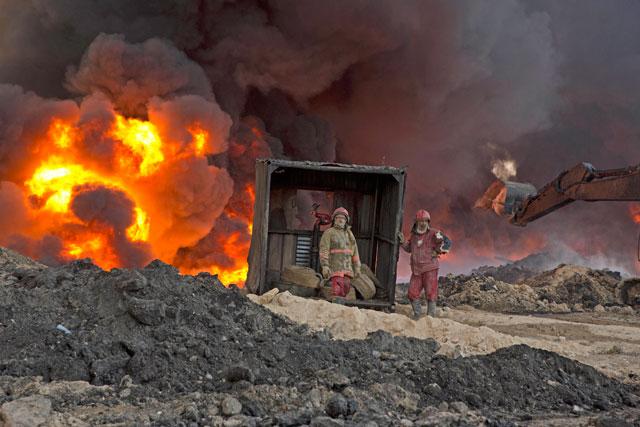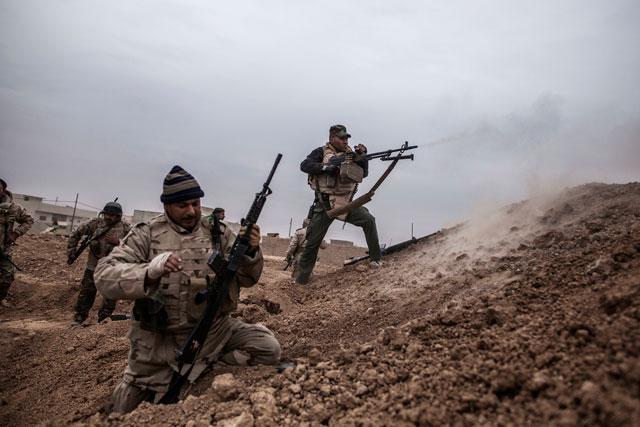You are here
Mosul edges towards full siege, families struggle to find food
By Reuters - Nov 30,2016 - Last updated at Nov 30,2016

Firefighters work to put out an oil fire set by Daesh militants in Qayyara, south of Mosul, Iraq, Monday (AP photo)
BAGHDAD/MOSUL, Iraq — A full siege is developing in Mosul as poor families struggle to feed themselves after prices rose sharply following the US-backed offensive on the Daesh-held city in northern Iraq, humanitarian workers said on Tuesday.
Some of the poorest families are finding it hard to feed themselves while others are hoarding and hiding food as they expect prices to rise further as the battle that started six weeks ago takes hold of the city.
"Key informants are telling us that poor families are struggling to put sufficient food on their tables," UN Humanitarian Coordinator in Iraq Lise Grande told Reuters. "This is very worrying."
Iraqi government and Kurdish forces surround the city from the north, east and south, while Popular Mobilisation forces — a coalition of Iranian-backed Shiite groups — are trying to close in from the west.
Retail prices rose sharply last week, after Popular Mobilisation fighters cut the supply route to Mosul from the Syrian half of the self-styled "caliphate", declared by Daesh two years ago over Sunni-populated parts of Iraq and Syria.
More than a million people are still believed to live in parts of Mosul under the control of the Daesh militants, who seized the largest city in northern Iraq as part of a lightning advance across a third of the country in 2014.
With the last supply route cut off, basic commodity prices in Mosul could double "in the short term", said a humanitarian worker, who declined to be identified.
Some 100,000 Iraqi government troops, Kurdish security forces and mainly Shiite militiamen are participating in the assault on Mosul that began on October 17, with air and ground support from a US-led international military coalition.
The capture of Mosul, Daesh's last major urban stronghold in Iraq, is seen as crucial towards dismantling the "caliphate".
Iraqi forces moving from the east have captured about a quarter of Mosul, trying to advance to the Tigris River that runs through its centre, in the biggest battle in Iraq since the 2003 US-led invasion that toppled Saddam Hussein.
"In a worst case, we envision that families who are already in trouble in Mosul will find themselves in even more acute need," Grande said. "The longer it takes to liberate Mosul, the harder conditions become for families."
Daesh arrested on Sunday about 30 shop owners accused of raising food prices in the city, to try to suppress discontent, witnesses said on Monday.
The group is relentlessly cracking down on people who could help the offensive in Iraq. Most of the people executed previously in Mosul were former police and army officers, suspected of disloyalty or plotting rebellions against the militants’ harsh rule.
The Iraqi military estimates there are 5,000-6,000 insurgents in Mosul, dug in amid civilians to hamper air strikes, resisting the advancing troops with suicide car bombs and sniper and mortar fire that also kill civilians.
An air strike targeting Daesh militants hit a clinic south of Mosul on October 18, killing at least eight civilians, Human Rights Watch said on Tuesday.
No retreat
Iraqi and coalition forces did not confirm the report, which said two militants and the extresmis group’s transport minister were also killed in the strike.
Daesh leader Abu Bakr al-Baghdadi, believed to be somewhere near the Syrian border, has told his fighters there can be no retreat from the city.
Some 74,000 civilians have fled Mosul so far, and the United Nations is preparing for a worst-case scenario which foresees more than a million people made homeless as winter descends and food shortages set in.
A Reuters correspondent in eastern Mosul saw civilians fleeing the fighting in Aden, a district supposed to be under Iraqi government control, in an indication of the difficulty the troops are encountering in holding terrain.
“Daesh is still there,” said Ehab, a high school student. “They drive around in cars; the situation is very, very difficult there. I am glad I made it out alive.”
Related Articles
MOSUL/BAGHDAD, Iraq — The United Nations issued a fresh warning on Wednesday about the humanitarian situation in eastern Mosul where the US-
MOSUL — Pushing carts loaded with bags, babies and the elderly, hundreds of people fled Mosul on Saturday after Iraqi forces retook tw
MOSUL — The Daesh terror group militants shelled areas recaptured by Iraqi forces in western Mosul, hitting civilians fleeing the fighting e












